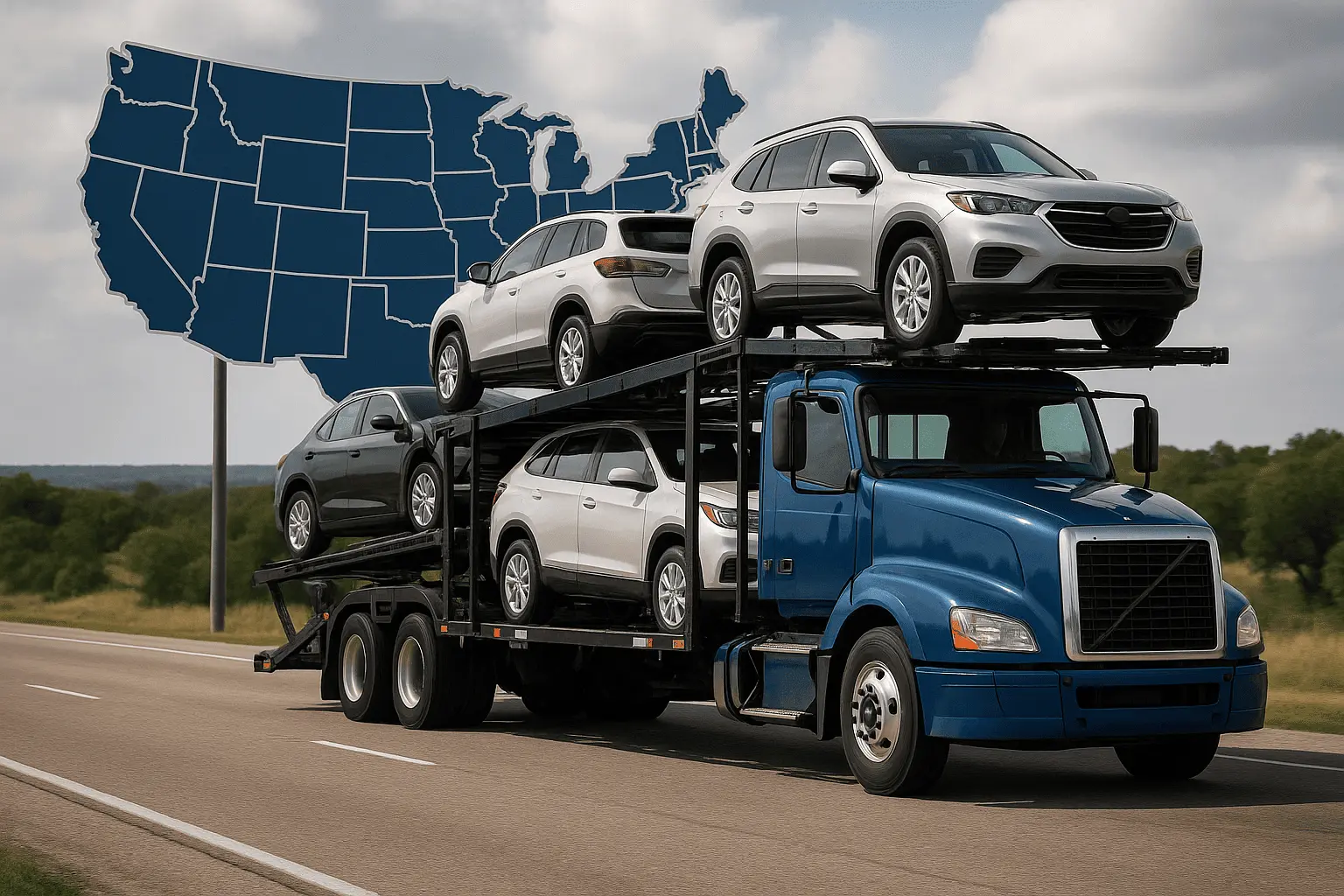Moving a car across states might sound like a fairly straightforward operation in theory. Just hand the car over to the carriers and pick it up at your preferred destination, right? Well, in reality, the auto transport industry is shaped by a mix of federal, state, and local laws that help protect everyone involved, from shippers and carriers to the vehicles themselves.
Key Takeaways
- Carriers must be federally licensed and insured. All interstate auto transporters must have a valid USDOT and MC number issued by the FMCSA, along with mandatory liability and cargo insurance coverage ranging from $750,000 to $5 million.
- Drivers must meet strict safety and service standards. Federal Hours of Service (HOS) regulations limit truckers’ daily driving time to prevent fatigue, while equipment inspections ensure vehicles meet DOT safety requirements.
- Both shippers and carriers share legal responsibilities. Shippers must provide accurate vehicle details and be present for inspection and signing of the Bill of Lading, while carriers must follow FMCSA regulations, maintain insurance, and secure vehicles properly.
- State regulations can differ widely. Many states require additional licensing for intrastate transport, enforce their own weight and emissions limits, and may impose special taxes or permits for haulers.
- Documentation ensures protection and accountability. Key documents include the Bill of Lading, proof of insurance, title, registration, valid ID, and lienholder authorization if the car is financed.
Whether you’re relocating across the country, purchasing a car out of state, or shipping vehicles as part of your business, it’s important to understand these car transport laws. In this article, we’ll walk you through the important rules, responsibilities, and documents you’ll want to know about before you ship your car.
What Do I Need to Transport Cars?
For businesses or individuals looking to become carriers, the requirements are significantly more stringent. It typically involves securing the proper motor carrier authority from the Federal Motor Carrier Safety Administration (FMCSA), obtaining commercial auto liability insurance, and ensuring all drivers meet specific licensing and medical certification standards.
Here’s a list of everything you’ll need as a carrier:
- Licensing and Registration: Every auto transport company must be registered with the FMCSA and possess a valid Motor Carrier (MC) number and U.S. Department of Transportation (USDOT) number. You can verify these on the FMCSA website to confirm the legitimacy of a carrier.
- Insurance Coverage: Federal law mandates that auto transport companies maintain liability and cargo insurance. This coverage protects the vehicle in case of damage during transit. Shippers should always request proof of insurance before booking.
- Carrier Qualifications: Drivers must hold a valid commercial driver’s license (CDL) and comply with hours-of-service regulations that limit driving time to ensure safety.
- Equipment Standards: Car haulers must meet DOT safety standards. Trailers are regularly inspected for brake systems, load securement, weight limits, and lighting compliance.
Shipper and Carrier Responsibilities
A successful shipment relies on a clear understanding of the roles involved. When both parties fully understand their responsibilities in the auto transport process, they will be able to avoid any future disputes. Let’s take a look at what each party needs to provide:
- Shipper responsibilities: To prepare your car for shipping, vehicle owners must provide accurate information about the vehicle, disclose any modifications (such as lifts or oversized features), and ensure the vehicle is free of prohibited items. The shipper must also be present at pickup and delivery for inspection, and signing of the Bill of Lading (BOL) is a critical document that details the vehicle’s condition.
- Carrier responsibilities: Transport companies must ensure compliance with all car hauling requirements, maintain required insurance coverage, and follow FMCSA safety guidelines. Carriers must also provide transparent terms and conditions, conduct thorough pre- and post-shipment inspections, and secure vehicles properly during transit.
By law, both parties must uphold their side of the agreement. Any negligence, such as failing to disclose damage or not securing the vehicle correctly, can result in disputes or denied claims.
Federal Rules
Federal law provides the foundation of auto transport regulation in the U.S. Carriers must follow the following laws in line with FMCSA standards:
- Licensing and Registration: All interstate car haulers need a USDOT number and MC authority. Customers can verify this on the FMCSA database.
- Insurance Requirements: FMCSA requires carriers to carry a minimum coverage of $750,000 to $5 million in liability insurance and cargo coverage sufficient to protect transported vehicles.
- Hours of Service (HOS) Rules: These rules limit truckers to a maximum of 11 driving hours per day, followed by mandated rest periods, reducing fatigue-related accidents.
- Safety Standards: Car haulers must regularly inspect and maintain equipment to meet federal safety requirements.
These rules are designed not only to protect carriers and shippers but also to safeguard other motorists on the road.
State Specific Regulations
While federal car shipping rules cover interstate transport, states tend to add their own layers of regulation for car transport. These state-specific laws may include:
- Intrastate Authority: Some states require additional licensing for haulers operating solely within their borders.
- Weight and Dimension Limits: Each state enforces its own limits on vehicle size, trailer length, and load weight. For example, oversize permits may be necessary if you’re hauling multiple SUVs or trucks.
- Emissions and Safety Inspections: In states like California, stricter environmental and safety laws may affect what vehicles can be shipped or how carriers operate.
- Tax and Fee Structures: Some states impose additional taxes or permits for commercial haulers operating within their borders.
Regulations differ from state to state, so it’s important for carriers to research requirements ahead of time. Vehicle owners should also confirm that their chosen hauler is properly licensed for both pickup and drop-off states.
What Documents are Needed for Car Transportation?
Documentation is one of the most critical parts of shipping a vehicle. The most common documents include:
- Bill of Lading (BOL): Serves as the receipt for the vehicle, details its condition, and acts as a legal contract between shipper and carrier.
- Insurance Documents: Proof of carrier insurance, which should be verified by the shipper before shipping begins.
- Vehicle Title and Registration: Required to confirm ownership of the vehicle.
- Photo Identification: The shipper (or their representative) must provide valid ID when handing over the car.
- Lienholder Authorization (if applicable): If a car is financed, some lenders might require written authorization before transport.
Without proper documentation, delays and disputes are almost inevitable. That’s why both shippers and carriers must ensure all paperwork is in order before transport.
Car shipping laws, rules, and regulations may seem complex at first glance, but they exist to protect everyone involved. From federal oversight by the FMCSA to individual state requirements, compliance ensures safety, accountability, and efficiency in vehicle transport.
Whether you’re shipping a single car across the country or managing fleet logistics, understanding these rules equips you to make informed decisions and avoid unnecessary complications.
Sources
- Federal Motor Carrier Safety Administration, “Cargo Securement Rules”, Accessed November 4, 2025.
- Federal Motor Carrier Safety Administration, “Insurance Filing Requirements”, Accessed November 4, 2025.






